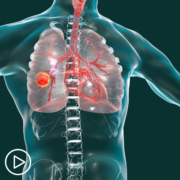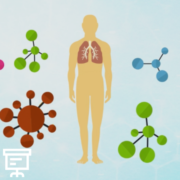Non-Small Cell Lung Cancer Treatment | Clinical Trials and Research Updates
Non-Small Cell Lung Cancer Treatment | Clinical Trials and Research Updates from Patient Empowerment Network on Vimeo.
What are the latest advances in lung cancer care? Lung cancer specialist Dr. Isabel Preeshagul shares highlights from recent conferences, promising clinical trial updates, and advice for people interested in joining clinical trials.
Dr. Isabel Preeshagul is a thoracic medical oncologist at Memorial Sloan Kettering Cancer Center. Learn more about Dr. Preeshagul.
See More From INSIST! Lung Cancer
Related Resources:
Transcript:
Katherine Banwell:
What are you excited about right now in lung cancer research?
Dr. Isabel Preeshagul:
I am excited and overwhelmed by the fact that we have so many approvals and so much exciting data that was just presented at ASCO and World Lung and ESMO that it’s next to impossible to keep up. And I’m happy that we have that problem, and I’m happy that the patients have – there’s a spotlight on lung cancer when we were in the shadows. And now, I think we have the spotlight.
And all of these approvals, you know, with it being Lung Cancer Awareness Month as well, I think is just so important. Just to make sure that we get the knowledge of these new approvals out there though, that is another struggle.
Katherine Banwell:
Well, are there any current clinical trials that look promising to you?
Dr. Isabel Preeshagul:
Yeah, I think there are many clinical trials. In the induction setting, there was some data that was just presented on ALINA looking at adjuvant alectinib (Alecensa). We just had a – we have approval for adjuvant osimertinib (Tagrisso) and the ADAURA trial.
But we are learning more and more that as these targeted therapies have approval in stage IV, we’re trialing them in stage III, and then we’re going to trial them in earlier stages and earlier settings. So, this has been the pattern of how drugs get approved. So, yes, there’s lots of exciting data coming through.
Katherine Banwell:
That’s excellent. Can you talk about antibody drug conjugates and where they fit into lung cancer care?
Dr. Isabel Preeshagul:
Yeah. That’s a great question. I don’t think anyone knows the answer as to where they fit in just yet.
We have probably over 300 antibody drug conjugates that are in development right now. And one of the more common ones that we use is trastuzumab deruxtecan (Enhertu), or TDXD, which is used in patients that harbor HER2 alterations in the stage IV lung cancer setting. It is basically almost like a Trojan horse. So, you have this antibody.
It’s typically IgG1, immunoglobulin. And then you have a linker, and then at the end of that linker is the warhead or the chemotherapy agent. So, the antibody comes in towards the cancer cell looking very innocent. It binds to the cancer cell. And, once it binds, then everyone inside the Trojan horse or this warhead rush into the cell and get to do its damage. So, it’s a totally different mechanism. We’re trying to outsmart some of the bypass mechanisms that cancer cells develop. And this may be the new wave, but stay tuned, more to come.
Katherine Banwell:
Right. So, it’s promising. How can patients find out more about current clinical trials?
Dr. Isabel Preeshagul:
So, you can always ask your healthcare practitioner if there are any clinical trials at the institution that you’re at, but clinicaltrials.gov has all the clinical trials that are available nationally and internationally.
You just type in your disease type. You can type in a couple keywords, EGFR maybe or ROS1 or stage IV, something along those lines, and then it should populate a list of clinical trials and what institutions have them open, if they’re still accruing or if they’re not, and a contact on that trial.
Katherine Banwell:
If a patient is interested in a clinical trial, what kinds of questions should they be asking their healthcare about the trial?
Dr. Isabel Preeshagul:
So, the first question to ask is, “Do we have any clinical trials that are appropriate for me?” If the answer is yes, “Are they appropriate for me now, or are they appropriate for me if what I’m on right now is not working?”
So, trying to figure out where that will be, and if they are appropriate for you now, how can I get evaluated, and how can we get things underway?
Katherine Banwell:
Yeah. What would you say to patients who are interested in participating in a clinical trial, but they’re nervous about it?
Dr. Isabel Preeshagul:
I think one thing that I love about being on a clinical trial is that there are more eyes are on you, because we are looking to get something approved, and we are just watching every single little granular detail. In a way, it’s almost like you’re being more micromanaged than if you were on standard of care because of just how many stops and checks there are, how many eyes are looking at your labs after the doctor and the nurse and the nurse practitioner, and the fellow take a look at everything. It’s 10 other people. So, it’s almost like it’s extra safe because of all of that. It’s exciting because you are hopefully getting tomorrow’s treatment today, right?
You’re trailblazing the way for other people after you. So, I think it’s exciting, but, of course, it’s nerve-wracking. It’s something new. You don’t know if it’s going to work. But I have to believe that the way that clinical trials are designed now and the clinical trials that we choose to open here, we really hope are going to be pushing the space forward.
























